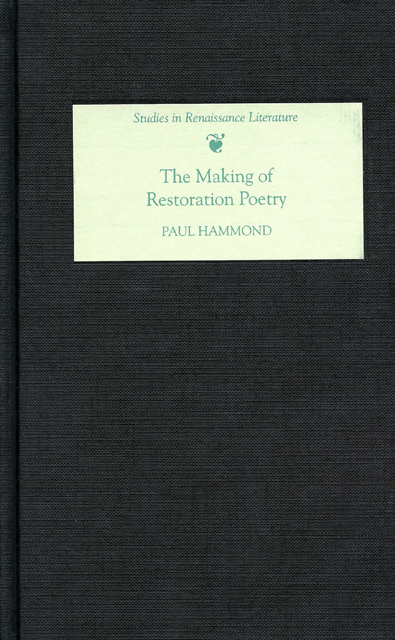2 - Censorship and the Manuscript Transmission of Restoration Poetry
Published online by Cambridge University Press: 18 March 2023
Summary
Tory. But ha’ye no Manuscripts?
Whig. Yes I have Three cases there beyond the Chimny, that I wou’d not change for Bodlies Library three times over.
To. What do they treat of?
Wh. Two of ‘em are altogether upon the Art of Government, and the Third is Cramm’d with Lampoon and Satyr. You sha’not name me any one Copy that has scap’d me; nor any Exigent of State; but I’le furnish ye out of these Papers with an Expedient for’t.
IN THIS episode from Sir Roger L’Estrange's Tory propaganda sheet The Observator, ‘Whig’ is showing ‘Tory’ around his library. The very existence of Whig's cache of manuscripts testifies to his seditious purposes: two whole bookcases are full of papers which allow Whig to campaign against the principles of government expounded in the officially licensed tracts, while the collection of satires preserves the work of the dissident literary imagination. L’Estrange is clearly suspicious of such a private, unofficial archive, a repository which both preserves and enables oppositional thought.
As Surveyor of the Press, L’Estrange had devoted much of the previous twenty years to an onslaught on oppositional publishing, searching the premises of writers, printers and booksellers, using spies and informers, and instigating prosecutions. The licensing of books before publication may have ensured that some dissident material never reached print, though printers and booksellers were probably more deterred by the laws of sedition and libel. Attempts to police the world of printing were never wholly successful, and after the lapsing of the Printing Act in 1679 at the height of the Popish Plot scare, there was a deluge of pamphlets opposing the policies of Charles II and his ministers. Nevertheless, the obvious dangers of printing oppositional material did promote a flourishing manuscript culture, in which scribes produced copies of the latest political and erotic poems which no printer would risk handling, but which readers who wanted to be au courant with public affairs were happy to lock away in their desks or transcribe into their own notebooks.
Various literary and linguistic strategies were evolved in this world of manuscript circulation. Names of authors disappear, or are attached speculatively or mischievously. Titles vary from copy to copy. Official tropes, the images of royal power, are parodically appropriated to oppositional causes.
- Type
- Chapter
- Information
- The Making of Restoration Poetry , pp. 28 - 48Publisher: Boydell & BrewerPrint publication year: 2006

